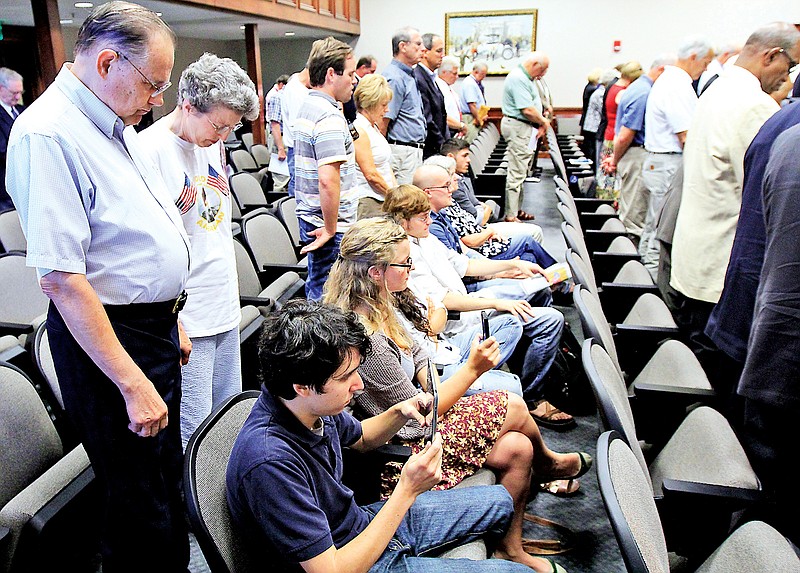Read More
Proceed with public prayers: Judge's order rejects lawsuit against Hamilton County Commission practice
Prayer shouldn't be so contentious. In fact, it should be calming and personal.
So personal that how and in what faith we pray is quiet; even something akin to one-size-fits-all yet highly customizable.
If the Hamilton County Commission had backbone and true concern for its constituents, prayer in the county meeting chambers would be inclusive off all religions, either through complete fairness of invitation or through a moment of silence when all persons in attendance can silently think their own prayer.
But the commission has lacked that backbone and instead in 2012 -- thanks to the county's practice of inviting ordained pastors to deliver invocations before each meeting excepting those outside the Judeo-Christian tradition -- invited a lawsuit. Tommy Coleman, a self-described secular humanist, and Brandon Jones, an atheist, sued.
They didn't ask the commission to stop praying -- indeed, no one can stop any of us from praying. Instead they asked the commission to lead prayer in a moment of silence.
This week, U.S. District Judge Harry S. "Sandy" Mattice dismissed most of their case, saying the commission's practice already has been deemed constitutional. Coleman and Jones are appealing, even though the county's attorneys used a recent Supreme Court decision out of Greece, N.Y., which covered nearly identical ground and called prayer a protected tradition.
In the New York case and here, officials say anyone requesting a chance to deliver an invocation may do so on a first-come, first-served basis.
And Judge Mattice, in his decision, wrote: "The county's policy, on its face, does not advance one religion over another; it allows for invocations from a variety of faiths and allows for prayers with religious references, but has not led to denigration or proselytizing."
Mattice said the county does not involve itself in the content of the prayers offered. "In fact, the county has never rejected a request to be added to the invocation schedule from an eligible member of the clergy under the policy," he wrote
But this is not enough. What this does is allow our commission to meet the letter of the law and policy if a Buddist or Muslim or even a High Pope of the Du Wah Diddy Church of Heathen Paganism or some such becomes No. 888 on the list with hundreds of Baptists pastors, Catholic priests and a handful of Jewish rabbis in front of them. The end result is the same: effective exclusion.
Of course, there is another, higher court. In the Bible -- King James Version -- we have the context built into the teaching of the Lord's Prayer. From that section in the Book of Matthew comes this passage:
"When you pray, you are not to be like the hypocrites; for they love to stand and pray in the synagogues and on the street corners so that they may be seen by men. Truly I say to you, they have their reward in full. But you, when you pray, go into your inner room, close your door and pray to your Father who is in secret, and your Father who sees what is done in secret will reward you ...."
Fixing this conundrum in our County Commission chamber -- giving everyone a opportunity to seek prayerful guidance at every meeting (not to mention saving taxpayer dollars on legal fees) -- could be an easily answered prayer: A simple, graceful, inclusive moment of silence.
